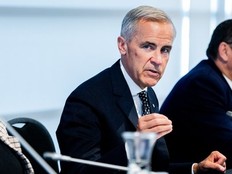GOLDSTEIN: Trump forcing us to admit our own economic failures

Article content
Canadians should be asking themselves why it took an American president launching a trade war against us for our federal and provincial governments to finally start addressing our economic problems they should have fixed decades ago.
Six months into Donald Trump’s presidency and tariff war against Canada, our national political conversation about what we need to do to make our nation economically stronger has been transformed.
To be sure, most of the promised transformation from our politicians thus far been pledges of future action, and there is legitimate skepticism about how much of it will occur, given the decades of political stalling on these issues in Canada.
But, at least our politicians are finally being forced to acknowledge failings they should have been acting on for decades, which made and continue to make our economy weaker, which they ignored.
That list includes:
— Expanding Canada’s trading opportunities to global markets beyond the U.S. which Canadian politicians have been talking about forever;
— Breaking down barriers to interprovincial trade which Prime Minister Mark Carney and the premiers say costs our economy up to $200 billion annually, a problem our federal and provincial governments created in the first place;
— Streamlining our onerous bureaucratic system for approving national infrastructure projects — a.k.a. “nation-building” initiatives — that has hampered our economy for generations because of red tape and bureaucracies created by the federal and provincial governments;
— Developing the mineral resources of Canada’s Arctic and Ontario’s Ring of Fire;
— Building a new pipeline (ideally new pipelines) to get our vast oil and natural gas resources from landlocked western Canada to tidewater and from there to international markets, instead of selling almost all of it to the U.S. at huge discounts, costing the Canadian economy up to $25 billion annually.
— Properly funding our armed forces so we have the capacity to patrol and protect our land, sea and air borders and to respond with military force to threats abroad — a fundamental requirement of any sovereign nation that wants to be taken seriously in global affairs;
— Paying members of the Canadian military a living wage in recognition of their importance in defending Canada’s interests both internationally and domestically.
— The federal government’s introduction in June of the “Strong Borders Act” to “keep our borders secure, combat transnational organized crime, stop the flow of illegal fentanyl and crack down on money laundering” in response to Trump’s demands.
The failure to address many of these issues up to now has resulted in Canada having the worst record of economic growth over the past decade as defined by real gross domestic product (GDP) per capita — a widely accepted metric of a nation’s standard of living — among the G7 nations.
If nothing changes, the Organization for Economic Co-operation and Development has predicted Canada will have the worst record of economic growth among developed nations from 2020 to 2060.
The irony of Trump’s tariff war against us is that while demonstrably damaging to our economy, it has also compelled Canadian politicians to finally focus, after decades of dithering, on how we can improve and sustain our economy, regardless of what Trump does, much in the same way a hanging focuses the mind.
The key question now is whether our politicians are serious, because rapidly restructuring the Canadian economy will mean making decisions over the span of a few months and a few years that our politicians have ignored not just for decades, but in many cases, for generations.













Postmedia is committed to maintaining a lively but civil forum for discussion. Please keep comments relevant and respectful. Comments may take up to an hour to appear on the site. You will receive an email if there is a reply to your comment, an update to a thread you follow or if a user you follow comments. Visit our Community Guidelines for more information.